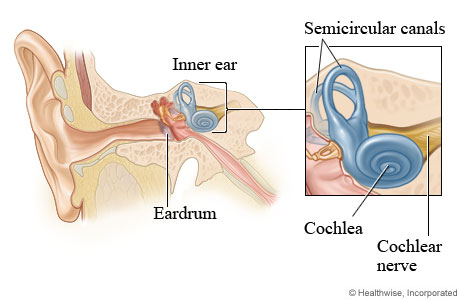Inner EarCurrent as of: May 4, 2017 Author: Healthwise Staff Medical Review: Anne C. Poinier, MD - Internal Medicine & E. Gregory Thompson, MD - Internal Medicine |
|
Inner Ear
Motion sickness occurs when one part of the balance-sensing system (inner ear, joints and muscles, or vision) may indicate that the body is moving, while the other parts do not sense motion. For example, when a person is in the cabin of a moving ship, the inner ear may sense the motion of big waves, but the eyes don't see any movement. This leads to a conflict between the senses and results in motion sickness. Current as of: May 4, 2017 Author: Healthwise Staff Medical Review: Anne C. Poinier, MD - Internal Medicine & E. Gregory Thompson, MD - Internal Medicine |
Search the
Healthwise Knowledgebase This information does not replace the advice of a doctor. Healthwise, Incorporated, disclaims any warranty or liability for your use of this information. Your use of this information means that you agree to the Terms of Use. Learn how we develop our content. To learn more about Healthwise, visit Healthwise.org. © 1995-2018 Healthwise, Incorporated. Healthwise, Healthwise for every health decision, and the Healthwise logo are trademarks of Healthwise, Incorporated. |